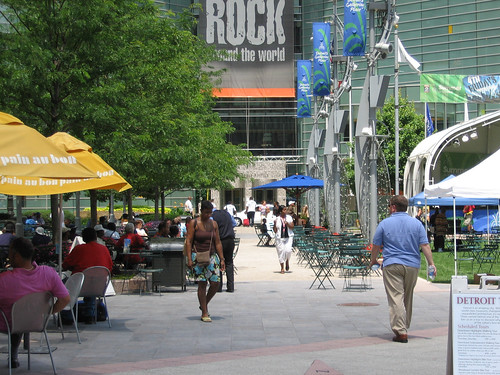From Sustainable Cities Collective:
Don’t count the Motor City out just yet. Companies are now fleeing its suburban office parks for downtown, writes Louis Aguilar in The Detroit News:
“When MyInsuranceExpert.com announced last week it is moving its headquarters and 85 workers from Troy to one of the downtown Detroit office buildings bought by entrepreneur Dan Gilbert, the online life insurance brokerage firm joined a growing trend . . .
“The employee relocations of major companies such as Blue Cross Blue Shield of Michigan, Gilbert’s Quicken Loans Inc. and DTE Energy eventually will leave a hole of empty office space in suburbia that’s bigger than Comerica Park. About 9,700 workers will leave the suburbs, creating an estimated 871,000 square feet of empty space.”
Who’s shrinking now?
This is certainly not to say that Detroit and some other Rust Belt cities don’t have major problems. They do. But, as the 21st century goes on, I and many others believe that cities, not suburbs – at least not suburbs as we have known them – are much better positioned for economic resilience because of their efficiency. And they are certainly much better positioned for environmental sustainability. Suburban office and housing markets have been weakening for some time, while downtown markets are either strengthening or suffering less damage from the effects of recession. www.plannersweb.com)” src=”http://farm7.static.flickr.com/6168/6163989324_7270fccc58_m_d.jpg” alt=”offices in suburban Detroit (by: Wayne Senville, Planning Commissioners Journal, www.plannersweb.com)” width=”240″ height=”159″ align=”left” />It happens in different places at different scales and speed, but it’s happening almost everywhere to some degree or other.
In Detroit, the downtown commercial vacancy rate remains higher than that in the suburbs (and both are scary-high), but the downtown rate has stabilized while the suburban rate is dropping fast, according to Aguilar’s article. Downtown Detroit’s rental rates for class A office space are already higher than those in the suburbs and rising; suburban rates are falling.
Aguilar continues:
“The major force behind the moves to Detroit is Gilbert, founder of Quicken Loans, who last year relocated 1,700 of the company’s employees from Livonia to the Compuware Corp. building and plans to move 2,000 more downtown in October.
“Since Quicken Loans moved to Detroit, Gilbert has purchased the Chase Tower, a 14-story building near Campus Martius; a parking deck called Two Detroit Center; the Madison Theatre Building in Grand Circus Park; and the Dime Building, a Daniel Burnham-designed structure at 719 Griswold, and its parking. And he’s signed a purchase agreement for his biggest acquisition yet, the 25-story and nearly half-empty First National Building.”
Real estate analysts believe that the presence of more office workers in the city will lead to more still more downtown businesses, along with restaurants and stores. Read the article in full here.





